How do Canadians feel about Pierre Poilievre and have the campaign-style efforts paid off?
November 19, 2023
This summer, we partnered with the Toronto Star to explore how Canadians feel about Conservative leader Pierre Poilievre. In July, we conducted a benchmark survey that looked at what Canadians felt they knew about Mr. Poilievre, how they felt about him, and how they would described.
Our intent was to re-ask the same questions months later to understand how the Conservative Party’s efforts to introduce and re-introduce its leader impacted public familiarity and impressions of him. In essence, we designed a pre- and post- study design, something we do often with clients who are planning to go in market to shift public opinion.
The results of this post-survey are based on a national representative survey of 2,000 Canadian adults conducted from November 9 to 12, 2023.
Key Findings:
- Increased Familiarity and Visibility: There has been a significant increase in the number of Canadians who are familiar with Mr. Poilievre. Compared to July, there’s a 7-point increase in those who say they know him well, equivalent to about 2.1 million Canadian adults. This increase in familiarity is consistent across different regions and age groups, indicating the effectiveness of the Conservative Party’s efforts to raise his profile.
- Improvement in Positive Impressions: Mr. Poilievre’s positive impressions among Canadians have increased. Now, 37% of Canadians have a positive impression of him, with an increase in favorable views from various demographics, including past Conservative, Liberal, and NDP voters. His favorability is higher compared to the previous Conservative leaders at similar points in their tenure and he is currently the most popular federal party leader.
- Perception of Personality and Ideas: The public’s view of Mr. Poilievre’s personality and ideas has also evolved positively. More people now perceive him as moderate, compassionate, and down-to-earth. A majority of those who feel they know him well view him as genuine, strong, and compassionate.
- Some Clarity on Political Stance and Potential Impact as Prime Minister: There’s an increase in the number of Canadians who feel they have a good understanding of what Mr. Poilievre and the Conservative Party would do if elected. This is reflected in the fact that 26% of respondents have a very good sense of his and the party’s plans, with another 34% having a fairly good sense. Additionally, there’s an increase in the percentage of people who would be happy or pleased if Mr. Poilievre became the Prime Minister, indicating a shift in public opinion and potential impact on future elections.
Introducing Abacus Data MRP A game-changing tool for GR, advocacy, and digital campaign targeting. A must for anyone in GR, campaigning, advertising, digital public affairs
Find out more
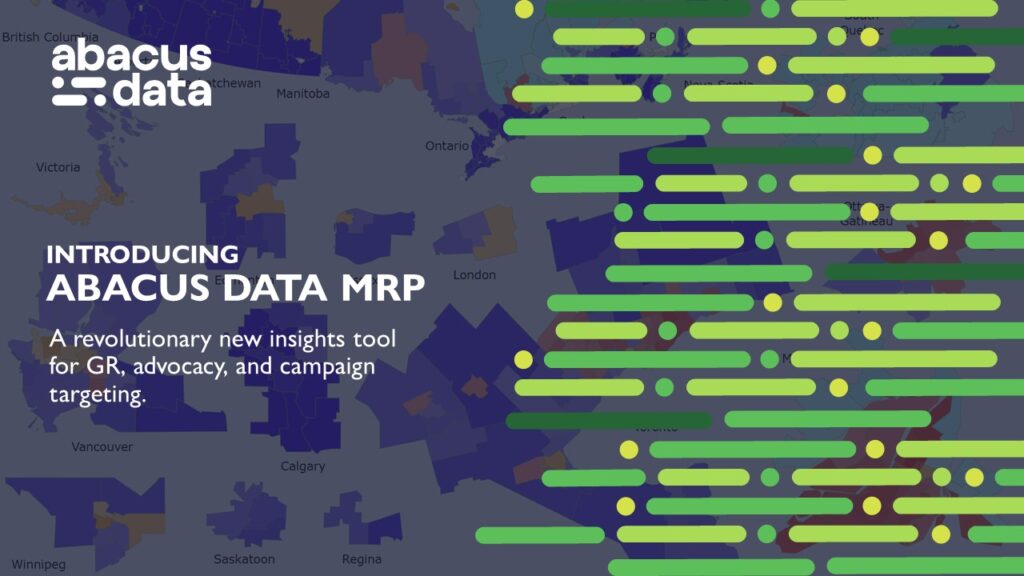
Here’s a detailed look at what we found.
Those who think they know Mr. Poilievre very or pretty well has increased by 7-points since July.
The efforts by the Conservative Party to increase the profile of Mr. Poilievre have paid significant dividends already. Today, 62% of Canadians say they know Mr. Poilievre very or pretty well, a 7-point increased from July. That’s the equilavent of 2.1 million Canadian adults who know feel they know the Conservative leader better than they did in the summer.
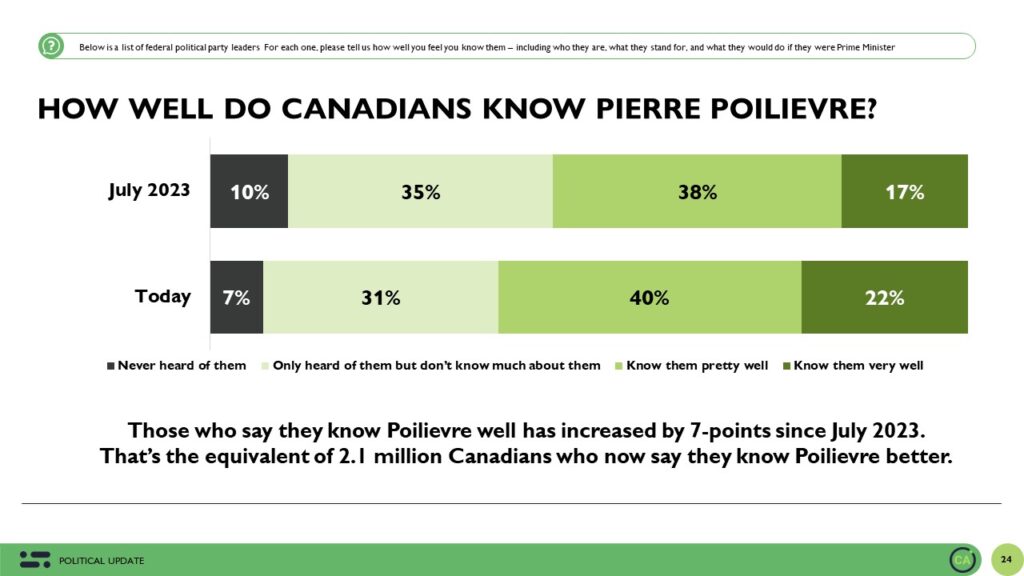
Compared with other federal leaders, Mr. Poilievre is certainly better known, but still trails both Mr. Trudeau and Mr. Singh in the proportion of those who have a good sense of who the leader is.
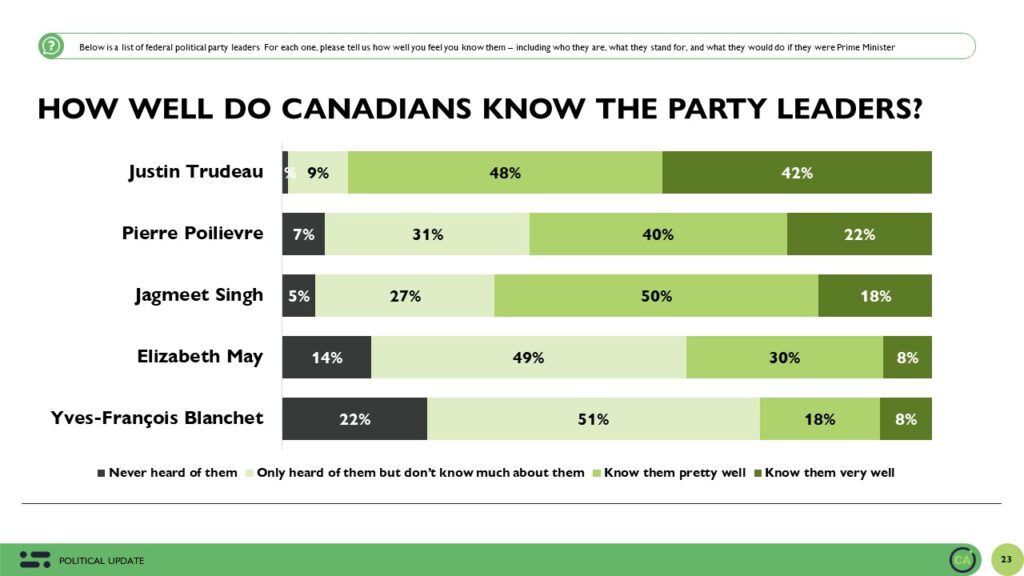
Familiarity with Mr. Poilievre has increased across the board, from a 10-point increase in BC and among those aged 18 to 29 to a 4-point increase in Quebec. About equal numbers of men and women now feel more familiar with him.
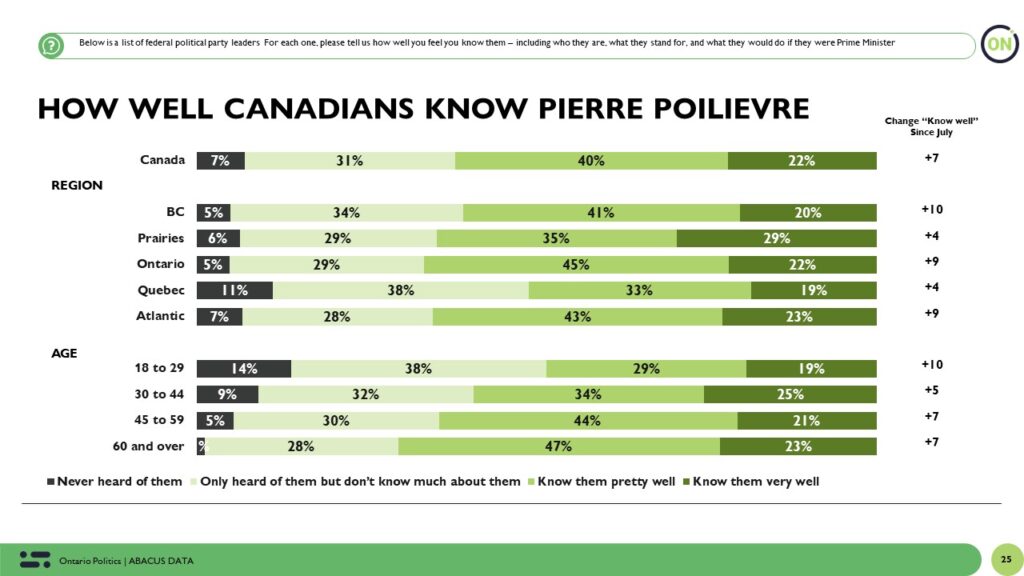
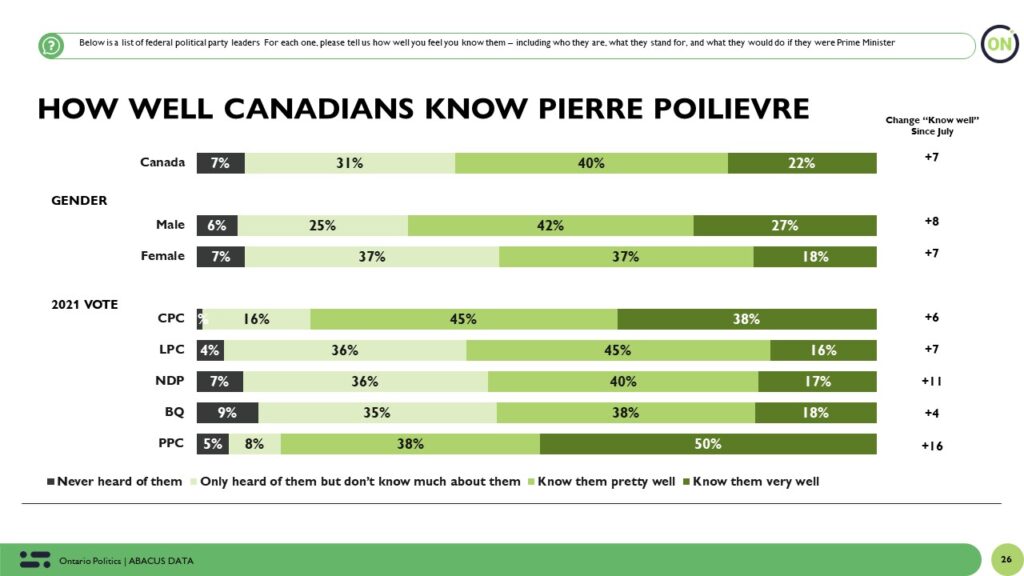
Impression have Mr. Poilievre have become more positive over this period.
Today, 37% of Canadians have a positive impression of Mr. Poilievre while 33% have a negative impression. 21% say they have a neutral impression while 8% don’t know much about it. Compared to July, his favourables are up 6, negatives up 2, and those who don’t know enough to say are down 2.
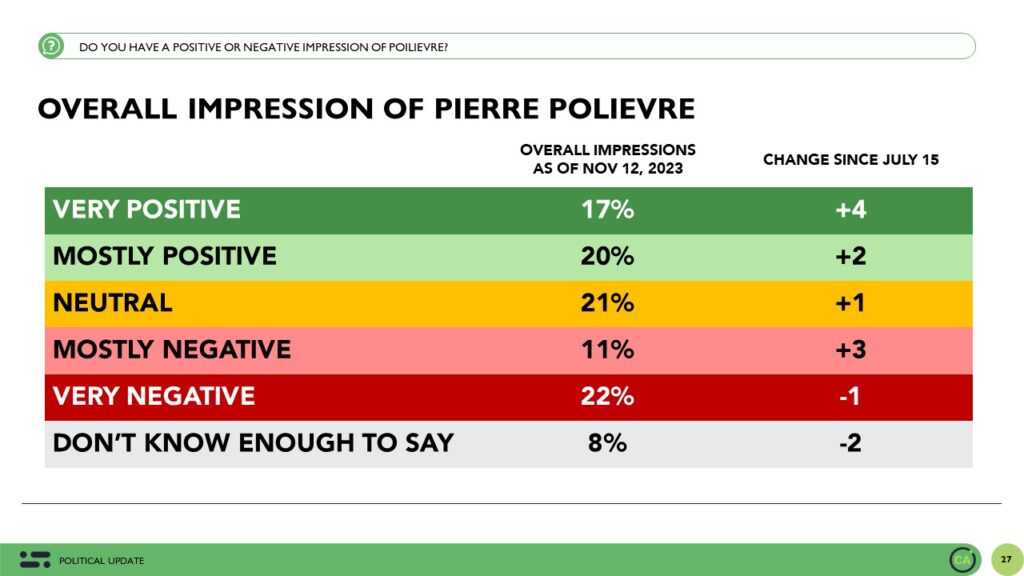
When we compared how people feel about Mr. Poilievre with how Canadians felt about the previous two leaders at this junction in their leadership, Mr. Poilievre is as known as Mr. O’Toole was following the 2021 election campaign and substantially more well know and defined that Mr. Scheer was at the same point in his leader.
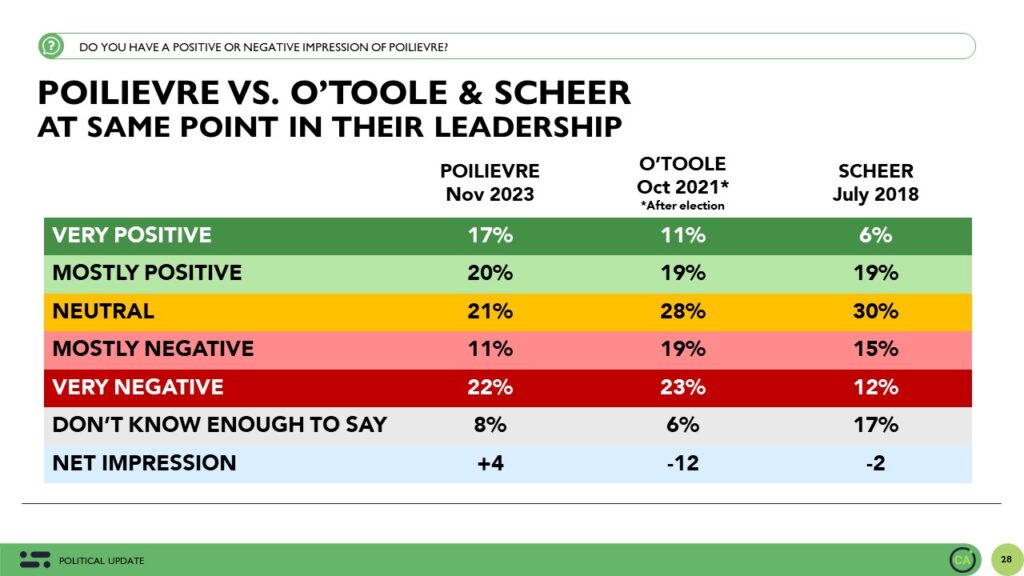
Comparatively speaking, Mr. Poilievre is now the most popular federal party leader with more having a favourable view of him than any other leader, including NDP leader Jagmeet Singh.
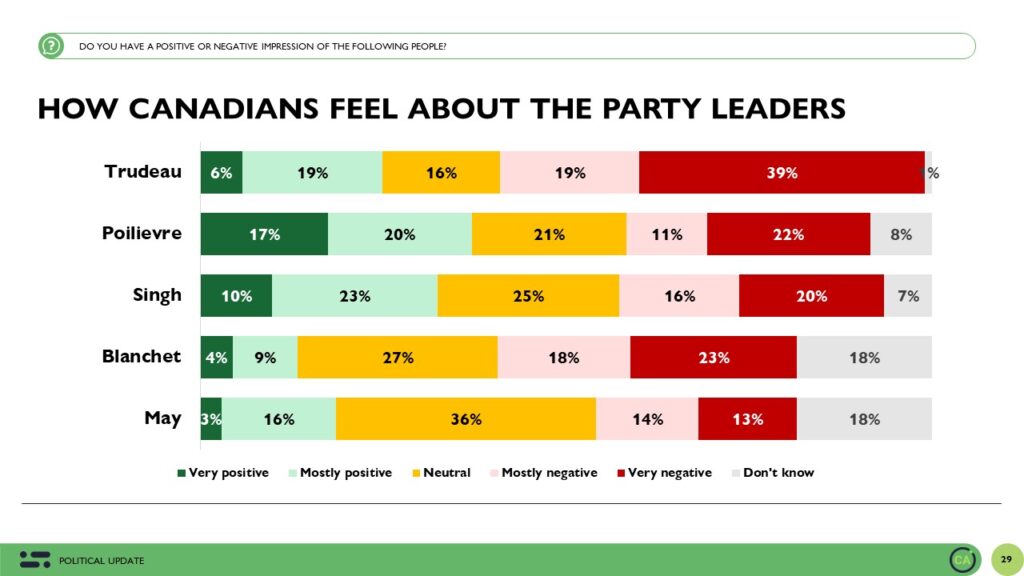
When we look how different groups have responded to Mr. Poilievre, we find that positive impressions have increased most in Ontario (+9), BC (+7), and Atlantic Canada (+5). They have also increased by double digits among those aged 60 and over (+10). He’s seen a 7-point increase in favourable impressions among women and +5 among men.
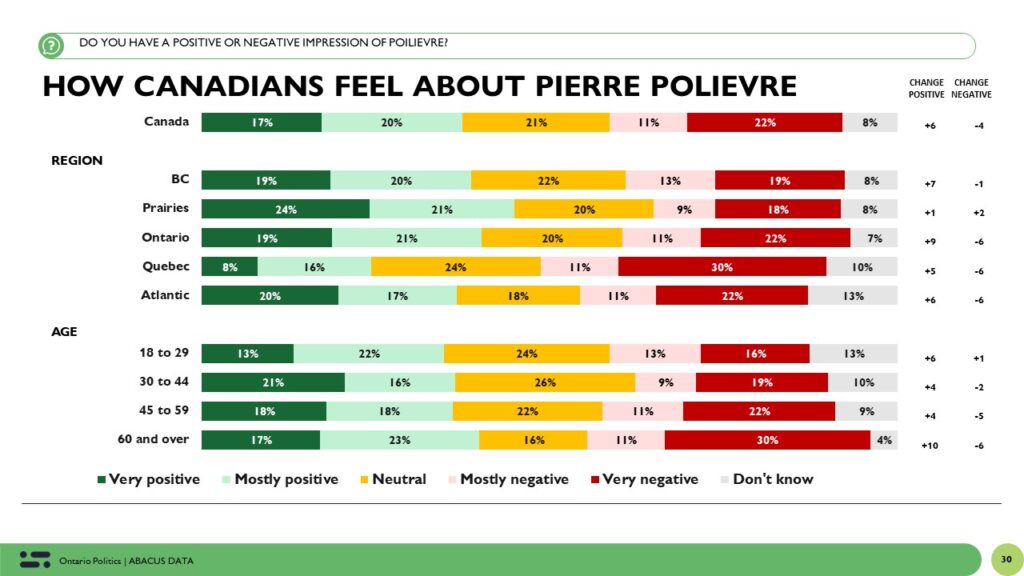
Across past party voters, his favourables among past Conservative voters are up 8, +7 among past Liberal voters, and +3 among NDP supporters. Today, 21% of past Liberal voters, 14% of past NDP supporters, and 48% of past People’s Party voters have a favourable view of the Conservative leader.
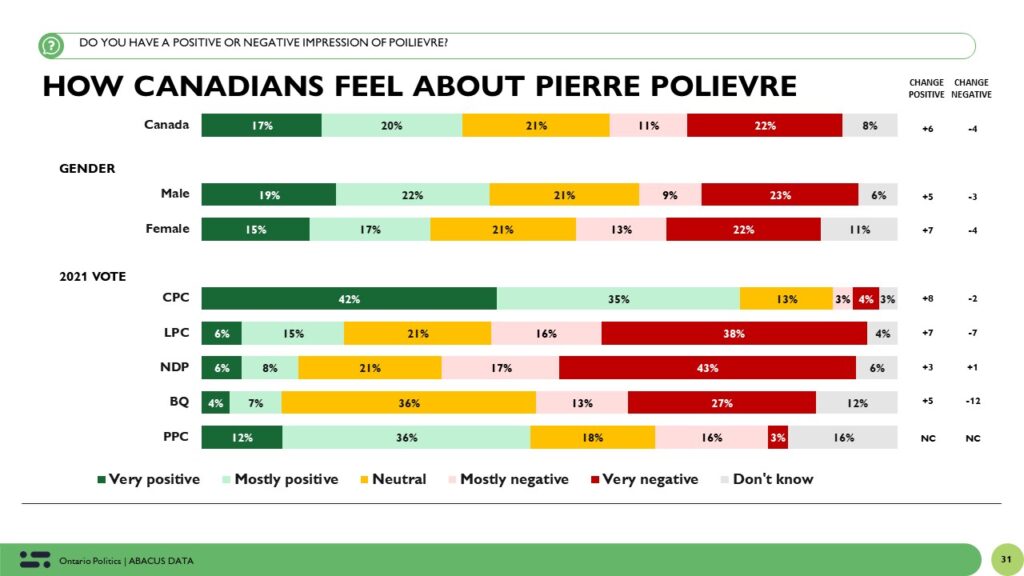
We also wanted to better understand what people like and dislike about Pierre Poilievre. Today, 33% say they like both his personality and ideas (up 6 since July), 11% like his ideas but not his personality (up 1), 7% like his personality but dislike his ideas (up 1) and 28% dislike both his ideas and his personality (down 2). 21% continue to say they don’t know enough about him to say (down 6 from July).
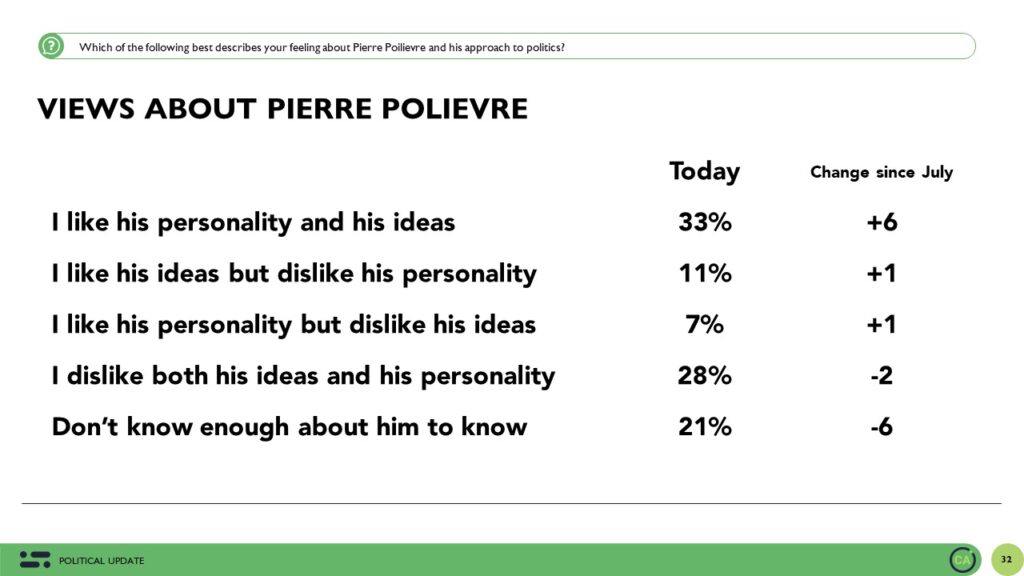
Digging deeper, we also show people words that could be used to describe Mr. Poilievre. Overall, we find more people use positive words to describe him than in July. The biggest shift is those who think he is moderate rather than extreme (+5), compassionate rather than uncaring (+4), and down to earth rather than elitist (+5).
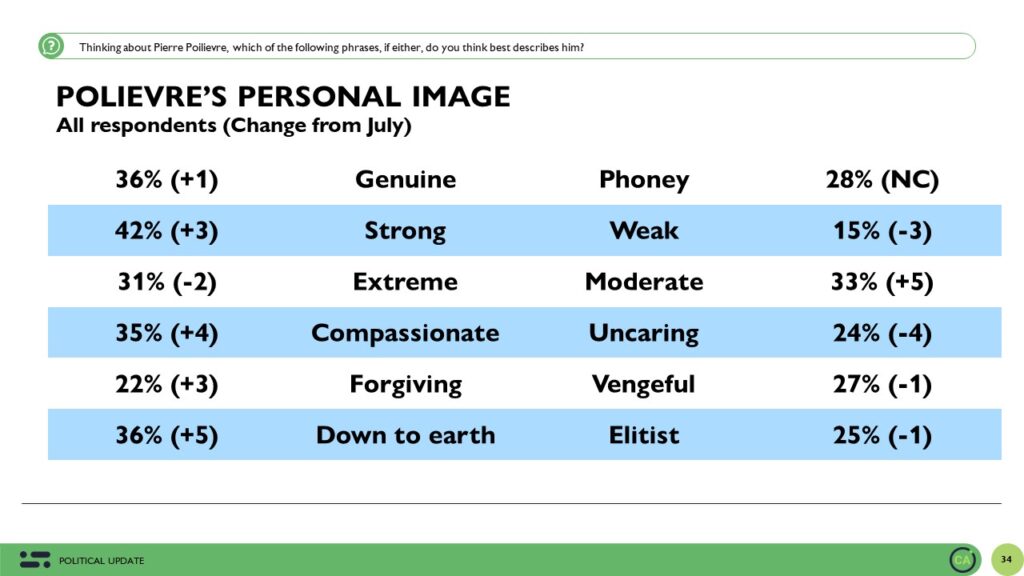
Among those who say they feel they know Mr. Poilievre well, a majority or close to a majority view him as geniune rather than phoney, stronger rather than week, compassionate rather than caring, and down to earth rather than elitist. Many are not sure whether he is either forgiving or vengeful and about equal numbers see him as extreme rather than moderate.
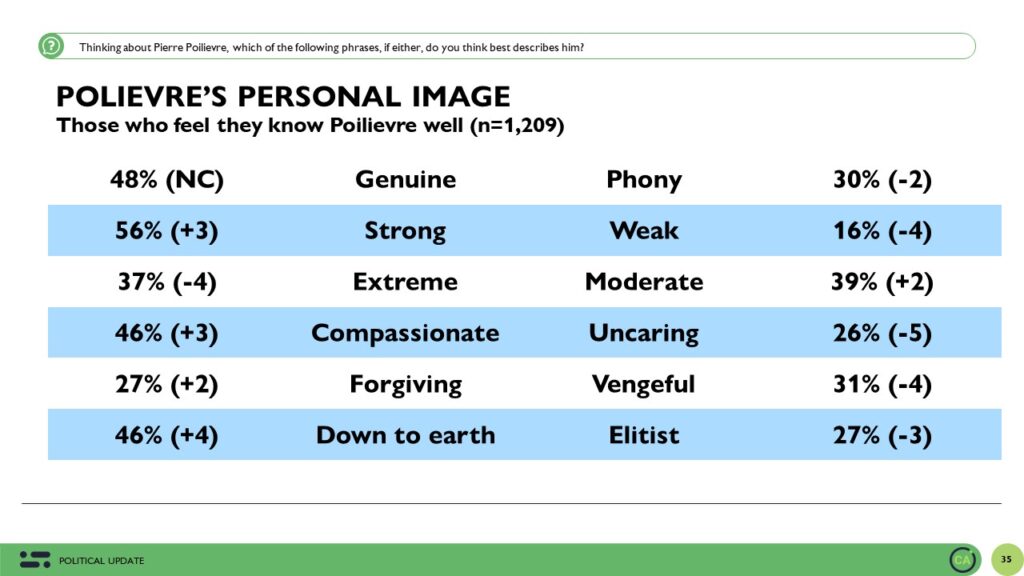
We also tracked whether people feel they have a good sense of what Poilievre and the Conservatives would do if they should win the next election. Keep in mind, far more Canadians today believe the Conservatives will win the next election than those who think the Liberals will win.
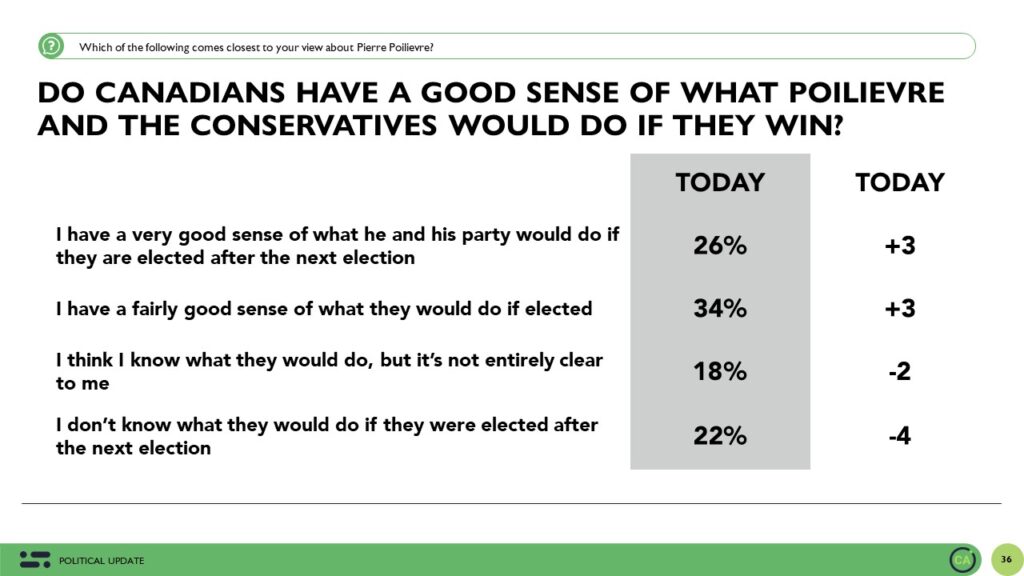
Overall, 26% say they have a very good sense of what he and the party would do if elected, that’s up 3-points. Another 34% think they have a fairly good sense of what they do, up 3 as well. Those who say they don’t know what they would do if elected account for 22% of the public and that’s down 4-points since July.
Among those who want a change in government and feel there is a good alternative out there, 68% signal they have at least a pretty good idea what a Poilievre-led government would do, up 3 points since July.
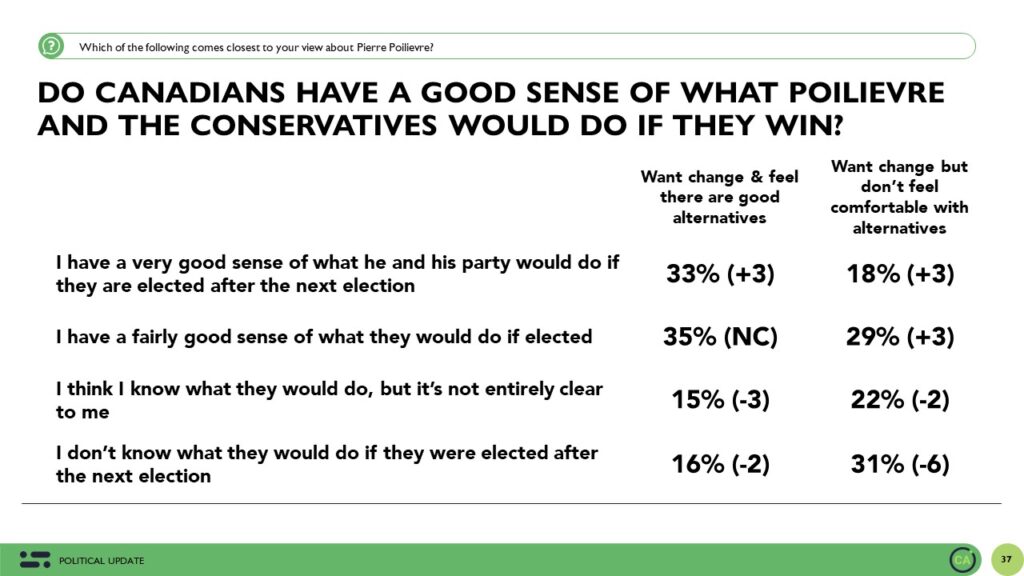
Finally, when asked how they would react if Poilievre became Prime Minister after the next election, 39% say they would be very happy or pleased, up 6 points since July while those who would be disappointed or very unhappy (31%) has dropped by 5-points.
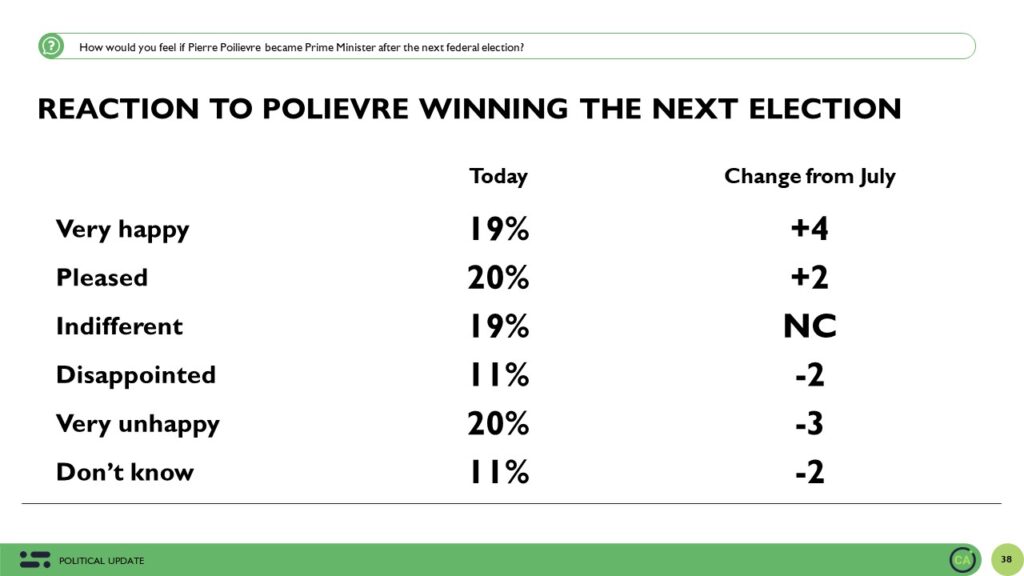
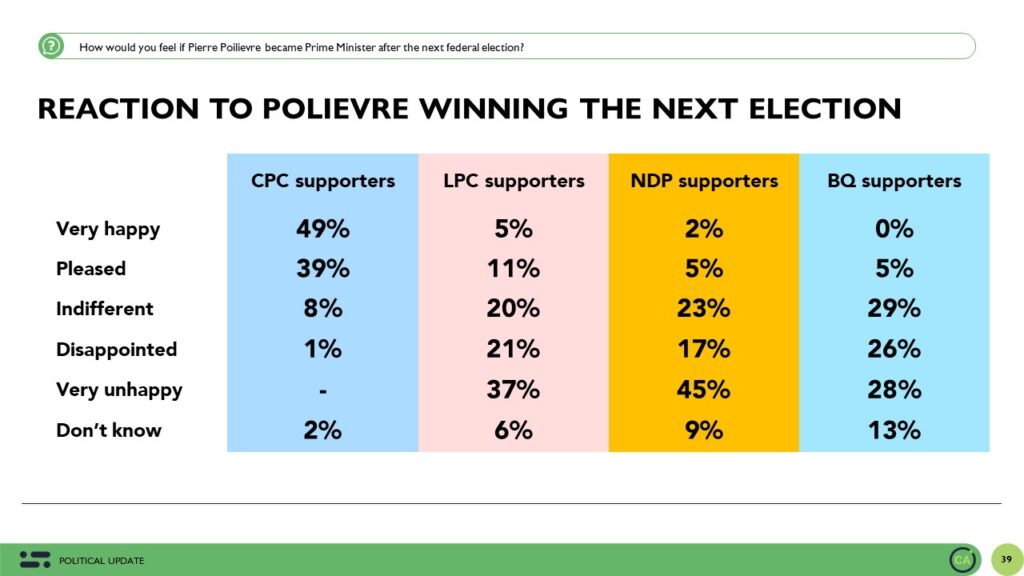
The Upshot
According to Abacus Data Chair & CEO David Coletto: “This pre-/post- study finds a clear shift in public perceptions and impressions of Conservative leader Pierre Poilievre. Familiarity and positive impressions of the Conservative leader have materially changed over the past several months.
This uptick is a clear testament to the success of the Conservative Party’s strategic efforts to elevate Mr. Poilievre’s profile through targeted advertising and campaign-like events. These initiatives have not only enhanced his visibility but have also positively influenced the public’s perception of him. The increase in the number of Canadians who feel they know him well, coupled with a rise in positive impressions, suggests that these marketing strategies are indeed paying dividends. The data shows that Mr. Poilievre is now more well-known and favorably viewed than his predecessors at similar points in their leadership (even after a national election campaign), and he currently stands as the most popular federal party leader.
However, the evolving political narrative also presents an opportunity for rival parties like the Liberals, NDP, and Bloc Quebecois. While Mr. Poilievre’s profile has grown, there remains room to further define his political persona and policies in the public eye. This scenario offers a window for opposition parties to craft and disseminate their counter-narratives, potentially influencing public opinion and redefining the political discourse. The challenge for these parties will be to effectively communicate their perspectives and policies, thereby capitalizing on the still-malleable public perception of Mr. Poilievre and the Conservatives.
The initial success of the Conservative Party’s efforts is also reflected in the gains they have made in vote intention, as indicated by a release we put out earlier this week.
This shift underscores the effectiveness of their current strategies in not only increasing Mr. Poilievre’s popularity but also potentially swaying the electorate’s intentions in future elections. The dynamic nature of public opinion, however, suggests that the political landscape remains fluid. The coming months will likely see continued efforts by all parties to shape and influence public perception, which will be crucial in the run-up to any future election.”
Methodology
The survey was conducted with 2,000 Canadian adults from November 9 to 12, 2023. A random sample of panelists were invited to complete the survey from a set of partner panels based on the Lucid exchange platform. These partners are typically double opt-in survey panels, blended to manage out potential skews in the data from a single source.
The margin of error for a comparable probability-based random sample of the same size is +/- 2.3%, 19 times out of 20.
The data were weighted according to census data to ensure that the sample matched Canada’s population according to age, gender, educational attainment, and region. Totals may not add up to 100 due to rounding.
This survey was paid for by Abacus Data Inc.
Abacus Data follows the CRIC Public Opinion Research Standards and Disclosure Requirements that can be found here: https://canadianresearchinsightscouncil.ca/standards/
ABOUT ABACUS DATA
We are the only research and strategy firm that helps organizations respond to the disruptive risks and opportunities in a world where demographics and technology are changing more quickly than ever.
We are an innovative, fast-growing public opinion and marketing research consultancy. We use the latest technology, sound science, and deep experience to generate top-flight research-based advice to our clients. We offer global research capacity with a strong focus on customer service, attention to detail, and exceptional value.
We were one of the most accurate pollsters conducting research during the 2021 Canadian election following up on our outstanding record in 2019.
Contact us with any questions.
Find out more about how we can help your organization by downloading our corporate profile and service offering.



